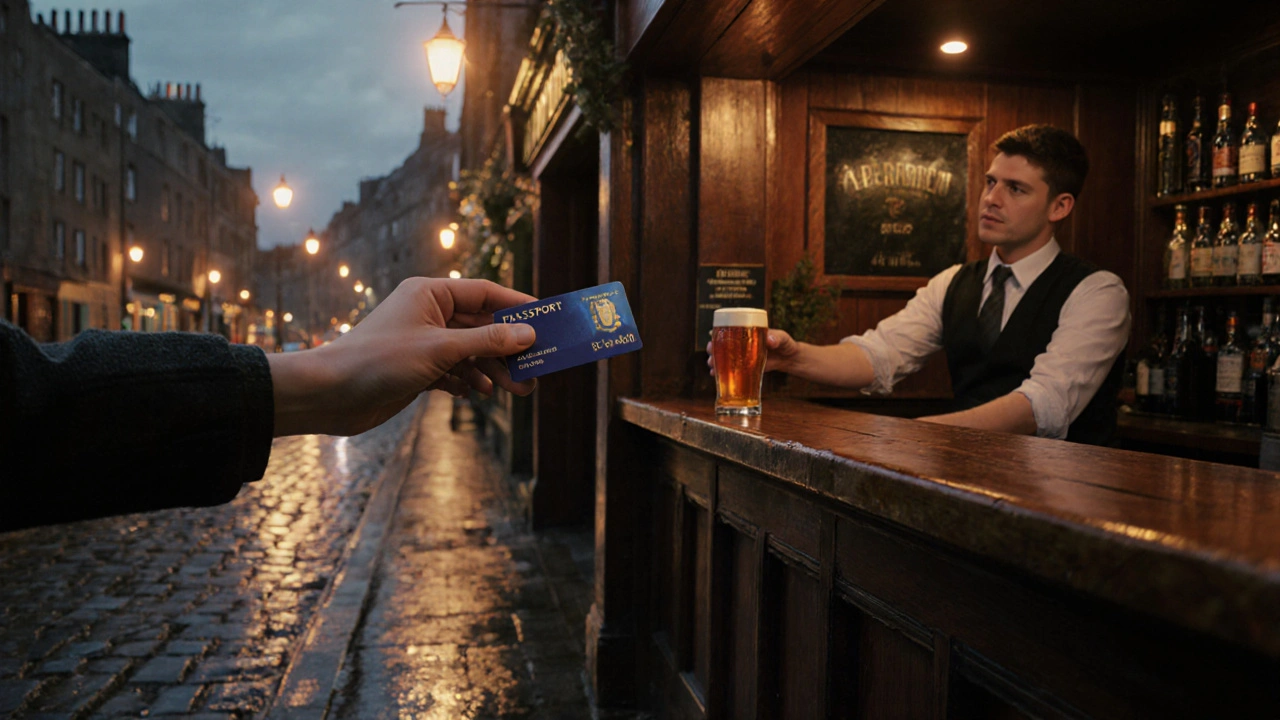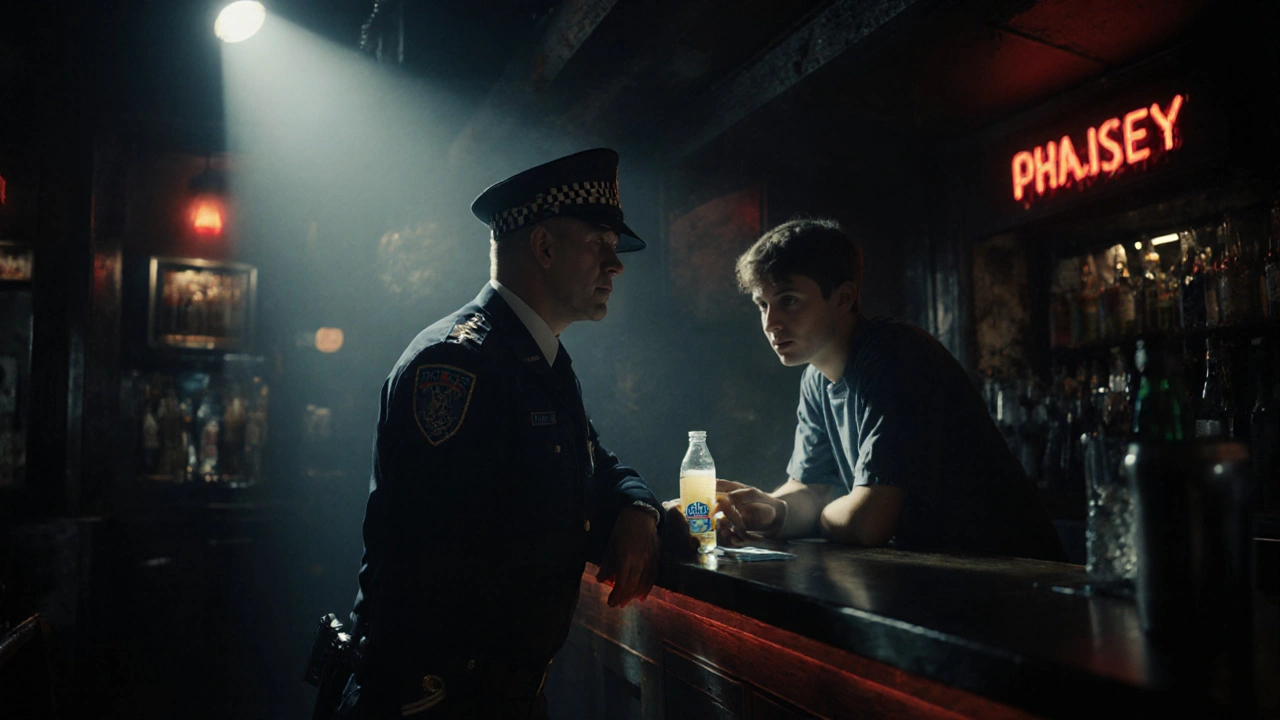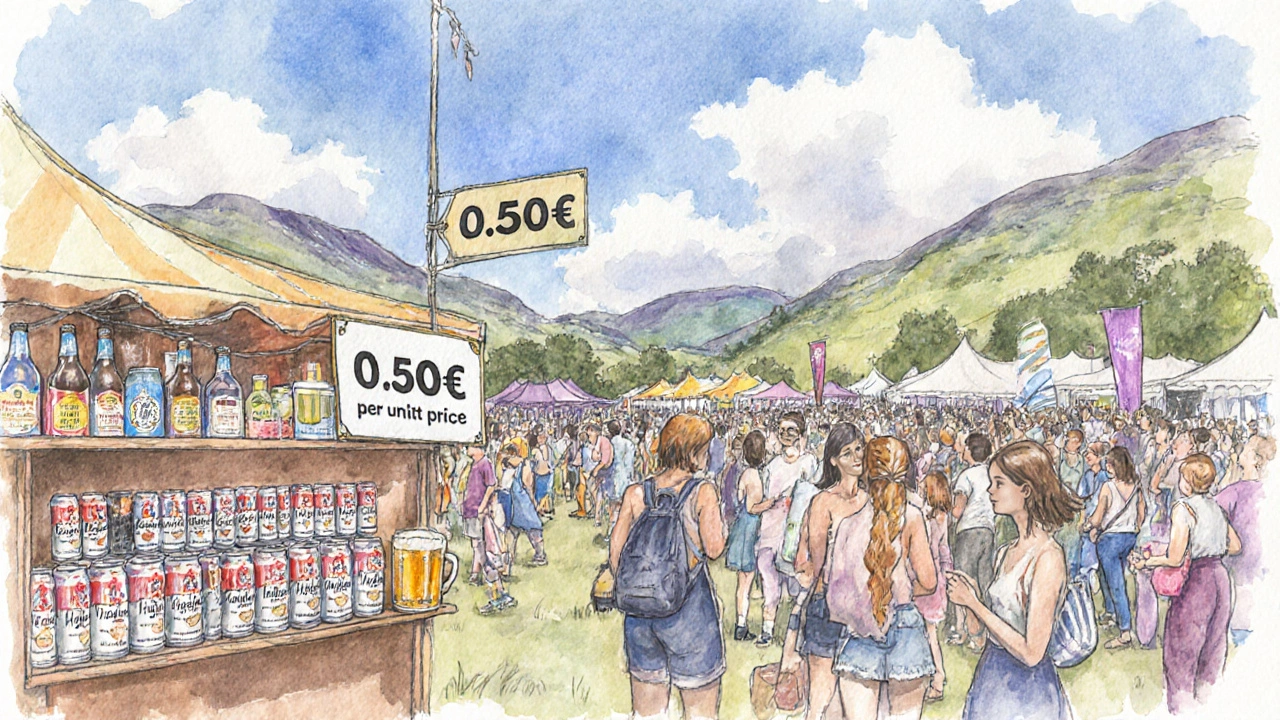
Scotland Minimum Unit Pricing Calculator
Calculate how much your drinks would cost under Scotland's Minimum Unit Pricing (MUP) law, which sets a floor price of £0.50 per unit of alcohol. This tool helps you understand the real-world impact of the 2018 policy that made cheap, high-strength alcohol less affordable.
Calculate Your Drink Cost
Results
Scotland MUPAlcohol Units:
Base Price:
MUP Charge (£0.50/unit):
Total Cost:
Important Note: This calculator shows the minimum price under Scotland's MUP law. Actual prices may vary based on retailer pricing policies, taxes, and other factors. MUP does not set a maximum price.
Scotland drinking age is 18 - you must be at least 18 years old to buy, possess, or publicly consume alcoholic drinks in Scotland. That short answer settles most casual queries, but the rule sits inside a web of licensing laws, public‑health measures, and enforcement practices that shape everyday life.
When we talk about Scotland's drinking age is the legal threshold set by the Licensing (Scotland) Act 2005. The act governs who can sell alcohol, where it can be sold, and what age checks are required. Understanding the framework helps you know why you’ll be asked for ID at a pub, what penalties retailers face, and how recent policies like Minimum Unit Pricing (MUP) influence youth drinking.
Legal framework behind the age limit
The central statute, Licensing (Scotland) Act 2005, establishes 18 as the minimum age for all alcohol categories - beer, wine, cider, spirits, and ready‑to‑drink beverages. Unlike England, Wales, or Northern Ireland, Scotland does not allow 16‑year‑olds to consume beer or wine with a meal. The law is uniform across the country, applying in both urban centres like Dundee and remote Highland villages.
Key related entities reinforce the rule:
- Police Scotland - responsible for enforcing licensing breaches and can issue on‑the‑spot fines.
- Retailers - licensed premises, off‑licenses, and supermarkets must train staff to check IDs.
- Health and Safety Executive (HSE) - monitors public‑health impacts of alcohol consumption.
- Underage drinking - a public‑health concern that drives education campaigns.
- Minimum Unit Pricing (MUP) - introduced in 2018 to curb cheap alcohol, indirectly affecting youth access.
How the law works in everyday situations
Whether you’re ordering a pint at a local bar or buying a six‑pack at a supermarket, the same age rule applies. Below is a quick rundown of what you can expect:
- Purchase: Staff must request a government‑issued photo ID (e.g., passport, driver’s licence) for anyone who looks under 25. The ID is scanned or visually inspected to confirm the person is 18 or older.
- Possession: It’s illegal to carry alcohol in public if you’re under 18, even if you’re not drinking it. Police may confiscate the drink and issue a warning or fine.
- Consumption in licensed premises: You can only drink on‑site if you’re 18+. Some “family‑friendly” pubs may allow children to have non‑alcoholic drinks, but the moment an alcoholic drink is served, the 18‑year rule kicks in.
- Private home: The law does not criminalize private consumption by under‑18s, but providing alcohol to them is an offence. Parents can be prosecuted for supplying drinks to their kids.

Common misconceptions and myths
Many people think Scotland follows the “16‑year‑old can have beer with a meal” rule that applies in Wales. The truth is:
- There is no age‑based exemption for wine or beer in any Scottish venue.
- Even a “soft‑drink” label on a cider does not bypass the age limit.
- Event‑specific licences (e.g., festivals) cannot lower the legal age; they must still enforce the 18 threshold.
Because the rule is consistent, enforcement is straightforward. Staff receive standard training modules that outline the legal consequences of serving under‑age patrons.
Penalties for breaking the rules
If a retailer or venue is caught selling alcohol to someone under 18, the penalties can be severe:
- Fines: Up to £5,000 per breach for the business, plus potential personal fines for the staff involved.
- License revocation: Repeated offenses can lead to a suspension or complete loss of the premises’ licence.
- Criminal records: Individuals who provide alcohol to minors may face prosecution and a criminal record.
For the under‑age drinker, the consequences are usually educational warnings, but in repeated cases police can issue fixed‑penalty notices.
Checklist for young people and parents
Keeping everyone safe is a shared responsibility. Use this quick checklist before a night out or a family gathering:
- Carry valid ID if you’re 18 or older; double‑check it’s not expired.
- Ask any venue staff about their ID‑checking policy -‑ they should be happy to explain it.
- Parents: avoid keeping alcohol in reachable places for minors. Store it locked away if you host parties.
- Be aware of MUP - the price floor is £0.50 per unit, so cheap, high‑strength drinks are less accessible to young people.
- If a friend offers you a drink and you’re under 18, politely refuse and report the incident to venue management.

Recent changes and the impact of Minimum Unit Pricing
In May 2018 Scotland introduced Minimum Unit Pricing (MUP), setting a floor price of 50p per unit of alcohol. While MUP doesn’t change the age limit, it reshapes the market:
- Cheap, high‑strength products that appeal to under‑age drinkers became less affordable.
- Studies by NHS Scotland showed a 7% drop in alcohol‑related hospital admissions among 16‑24‑year‑olds within the first two years.
- Retailers adjusted their stock, offering more low‑strength, higher‑price options.
These public‑health measures complement the legal age, aiming to reduce binge drinking and long‑term health risks.
Quick reference table
| Action | Minimum Age | Key Notes |
|---|---|---|
| Purchase from licensed premises | 18 | Photo ID required; staff must refuse under‑18s. |
| Public possession | 18 | Under‑18s risk confiscation and fines. |
| Consumption in bars/pubs | 18 | Enforced by venue licence conditions. |
| Private home consumption | 0 (no penalty for personal use) | Providing alcohol to minors is illegal. |
| Supply by adults to minors | Illegal at any age | Can lead to fines, licence loss, criminal record. |
Frequently Asked Questions
Can a 16‑year‑old drink wine or beer with a meal in Scotland?
No. Scotland does not have a ‘16‑with‑a‑meal’ exception. All alcoholic drinks require the consumer to be at least 18, no matter the setting.
What ID is accepted for age verification?
A valid passport, a UK driver’s licence, or a photographic proof of age card (PASS, Proof of Age Standards Scheme) is accepted. The ID must show a photo, date of birth, and be non‑expired.
Are there any penalties for a teen caught drinking in public?
Police can confiscate the drink and issue a fixed‑penalty notice (often £50). Repeated offences may lead to a youth warning or referral to a youth offending team.
Do private parties have the same age rules?
While private consumption isn’t a criminal offence, supplying alcohol to anyone under 18 is illegal. Hosts can be prosecuted and face fines.
How does Minimum Unit Pricing affect young drinkers?
MUP raises the price floor for cheap high‑strength drinks, making them less attractive to budget‑conscious youth. Early data shows a modest decline in binge‑drinking episodes among 16‑24‑year‑olds.
Comments (10)
-
Zoe Hill October 11, 2025
Wow the MUP calculator really shows how pricy a cheap night out can get.
-
Albert Navat October 22, 2025
Yo the MUP algorithm essentially applies a floor function to the ethanol unit vector, so any beverage with an ABV‑volume product that yields less than £0.50 per unit gets auto‑adjusted upward.
-
King Medoo November 1, 2025
When you look at the Minimum Unit Pricing scheme you quickly realise it’s not just about raising the price tag on a pint. It is a public health intervention that attempts to curb harmful drinking patterns that have plagued communities for decades. The law sets a floor of fifty pence per unit, which in practice translates to a noticeable bump on most low‑cost, high‑ABV beverages. Proponents argue that this price floor nudges consumers toward cheaper, lower‑strength options, potentially reducing alcohol‑related harm. Critics, however, claim it unfairly targets the poorest drinkers, driving them to unregulated markets or illicit sources. From an ethical standpoint I find it hard to justify punishing moderate drinkers for the choices of a minority. The evidence from early implementation phases does show a modest dip in off‑sale sales of cheap spirits. Yet the data also reveal a slight uptick in cross‑border purchases, as Scots head south to England where the rule doesn’t apply. That, to me, hints at a loophole that could undermine the policy’s intended health benefits. Moreover, retailers have responded with clever pricing strategies, bundling drinks or offering ‘value packs’ that skirt the unit floor. Such work‑arounds dilute the straightforwardness of the law and make it harder for consumers to understand the true cost. If the government wants to truly shift drinking culture, it needs to couple pricing with robust education and support programs. Simply slapping a price tag on alcohol without addressing underlying addiction issues feels like a Band‑Aid solution. That being said, I do appreciate the boldness of the move; it sends a clear message that public health can trump profit motives. In the end, the success of MUP will depend on continuous monitoring, transparent reporting, and willingness to tweak the policy as new evidence emerges. 🤔🍻
-
Rae Blackburn November 12, 2025
The so‑called "public health" price hike is really just a covert way for big pharma‑type interests to control the market and push us toward synthetic alternatives we can’t even trace what’s in them
-
LeVar Trotter November 22, 2025
Just to add some context, the Minimum Unit Pricing is calculated by multiplying the alcohol by volume (ABV) by the volume in millilitres, then applying the £0.50 per unit floor. This means a 500 ml bottle of 5 % ABV cider will have 25 units, so the minimum price would be £12.50 before any retailer markup. If you plug those numbers into the calculator you’ll see exactly how the total cost is derived, which can be helpful if you’re budgeting for a night out or comparing different drinks.
-
Addison Smart December 2, 2025
That explanation really clears things up – I’d also point out that while the price floor sounds simple, the real‑world impact varies by region, so policymakers should monitor local data and adjust thresholds if needed to keep the system fair and effective.
-
E Jones December 13, 2025
What most people don’t see is that the MUP policy is just the tip of an iceberg of coordinated surveillance; hidden sensors in bars report sales in real time to a central database that feeds AI models predicting drinking hot‑spots, and those models are then used to steer funding toward certain community projects that align with corporate agendas.
-
David Smith December 23, 2025
Honestly this whole thing feels like a lazy attempt to look progressive while doing nothing more than shifting the problem to a different pane of glass.
-
Lissa Veldhuis January 3, 2026
Let me break it down: the MUP isn’t a miracle cure, it’s a blunt instrument that only scratches the surface of a deeply rooted cultural issue – you can’t fix systemic binge‑drinking by adjusting a price tag alone.
-
Michael Jones January 13, 2026
Think of the calculator as a tool for empowerment – the more you know about what you’re paying, the better you can make choices that align with your health goals.
